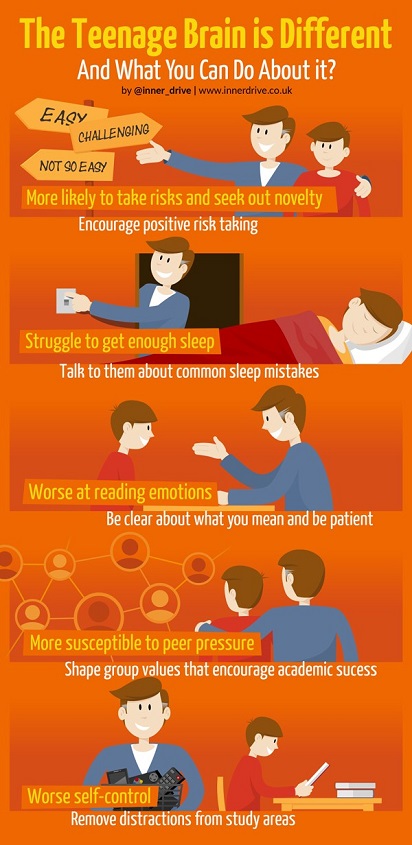4 A psychologist’s experience of working with teenagers
Here you can see psychologist Bradley Busch [Tip: hold Ctrl and click a link to open it in a new tab. (Hide tip)] , who works with teenagers in schools and on the playing fields, talking about some of the implications of teenagers thinking differently to adults.
Activity 2 Bradley Busch explains his work in schools
Bradley Busch runs workshops in schools with teenagers where he discusses their developing brains in relation to decision-making and judgement. In this video, he is interviewed by The Open University’s Ben Oakley about the main talking points teenagers respond to in those workshops. What are the three main things that engage teenagers?
Transcript: Interview with Bradley Busch (Part 1)
Discussion
The most common topic that teenagers discuss is about their self-control (control of impulses). Bradley talks about people having different approaches to how much they can persist at something for an eventual reward (delayed gratification). Studies have shown that this is a key life skill. Teenagers often identify how they can easily get distracted and give in to impulses. Removing distractions to help them keep on task was one practical tip Bradley raised, and it is clear that sticking at revision or practice over time is an important aspect of those who wanted to progress in education or sport.
The second topic is thinking about how sensitive the teenage brain is to social status and the influence of peer pressure, and how this can often dominate actions. The example of smoking was given in which, if they are alone, teenagers may not make certain decisions, but in the company of their peers they often choose differently: there is a link here to self-control with regards to being distracted from original intentions.
The third topic is handling failure or mistakes. Bradley Busch suggested a tip for schools, and coaches, is to create an environment in which mistakes are not mocked or criticised: a place where it is safe to fail as part of learning and questions such as ‘what would I do differently next time?’ are posed.
This interview could have covered a lot more ground but this infographic (Figure 2) summarises Bradley Busch’s ideas on what coaches/teachers can do when they know how the teenage brain is different. Examine each of these five recommendations.
If you want to find out more, read his 2015 Guardian newspaper article: Secrets of the teenage brain: a psychologist’s guide for teachers. You will see Bradley Busch again shortly, as you hear his thoughts on confidence and emotions.

